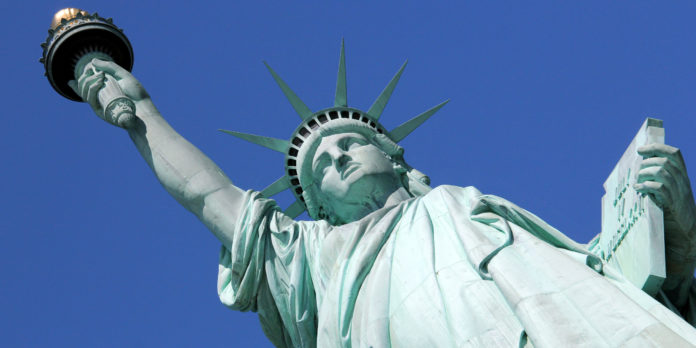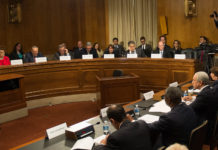
A recent poll conducted by the Pew Research Center found that around one in 10 Americans now identifies as a libertarian, taking lead from a political philosophy that, despite renewed popularity, boasts an intellectual tradition that stretches back centuries.
That same poll found that 23 percent of Americans did not know what libertarianism was. Part of the reason that the term causes such confusion is that it unites a wide variety of perspectives, ranging from anarchistic left to the conservatives of the right.
So, here’s what you need to know.
What is libertarianism?
Libertarianism, most simply, promotes the absolute and inherent liberty of the individual. These liberties require no justification and extend to freedom of speech, religion, association, the right to property ownership, equality under the law, and bodily autonomy.
This means that libertarians tend to believe in limited or minimal government authority. Governments, by this philosophy, only exist to protect citizens’ rights and are only to intervene where those rights and freedoms are threatened. Injustice, the libertarian deems, exists wherever an individual or organized entity works to restrict or impede a person’s liberty.
Libertarians promote personal responsibility and charity, and they also traditionally oppose corporatism. These values underpin the concept of spontaneous order, that social order is not imposed by a central authority or under government direction but that it arises naturally within large communities of individuals working in coordination.
READ MORE:
- 10 important things to know about the House Freedom Caucus
- What is universal healthcare?
- What is socialism, really?
Where did it come from?
The ideological origins of libertarianism can be traced right back to the ancient world, long before the word had been coined. Chinese thinker Lao Tsu wrote that “without law or compulsion, men would dwell in harmony” as Greece’s philosophers and poets expounded the notion of a higher natural law or order that existed above the authority of state and royalty.
Libertarianism in a modern sense, however, first found footing during the Enlightenment. The philosophy shares much of its history with classical liberalism in the 18th-century as notions of free will inspired a range of important French, Scottish, and American thinkers. Three fundamentally key philosophers from that time were John Locke, Adam Smith, and John Stuart Mill.
Often called the ‘Father of Classical Liberalism,’ Locke is most noted for his influential theories of social contract, the self, and private property. Property as the fruit of an individual’s labor, he asserted, is a right. Likewise, the role of the government is to protect civil rights and not to impose upon them. Meanwhile, Smith wrote against government intervention in the affairs of citizens. He was also a noted critic and opponent of trade unions and corporations. Mill’s utilitarianism saw him emphasize that the purpose of power was to preserve an individual’s freedom to pursue pleasure and happiness in his essay “On Liberty.”
Other philosophers, like the French Baron de Montesquieu suggested a separation of government powers.
These classical liberal ideas had an enormous impact on the thinking of American and French revolutionaries. In France, the ideas were enshrined in a similar way through the 1789 Declaration of the Rights of Man and Citizen.
In the United States, drawing directly on Locke, America’s Founding Fathers included in the Declaration of Independence that the very purpose of government was to protect every citizen’s “unalienable rights” of “life, liberty, and the pursuit of happiness.”
The anarchistic notion of individualism persisted with American writers such as Ralph Waldo Emerson and Henry David Thoreau. However, by the early 20th century, the modern brand of American libertarianism, more commonly associated with free-market conservatism, was being expounded by writers such as H. L. Mencken, Leonard Read, and Ayn Rand.
After President Franklin D. Roosevelt’s federal initiatives and programs under the New Deal, many of these intellectuals rejected the name liberal, which had come to signify socialistic ideals, and began to search for another name. By the 1960s, Murray Rothbard was popularising the term libertarian that had been coined by an anarcho-communist called Joseph Déjacque in 1857 and drawn from the French “libertaire.”
READ MORE:
- Who’s going to challenge Trump in 2020? Here are the super-early contenders
- There’s no such thing as the ‘alt-left’—and here’s why
- Untangling antifa, the controversial protest group at war with the alt-right
Libertarianism: The Left and the Right
In 1971, the Libertarian Party was formed in the U.S. advocating for free-market capitalism and fighting regulation on a range of socio-economic issues.
This right-leaning libertarianism interprets the market economy under Smith’s notion of spontaneous order. It’s within this right-wing framing that free-market capitalism and private property rights are strongly supported. The authority of centralized government is reduced and state welfare abolished. Some advocate what is called a night-watchman state equipped with police, army, and justice system for the protection of private ownership, citizen interaction, and to act against aggression.
The ideas of right libertarianism are propagated by several think tanks including the anarcho-capitalist Center for Libertarian Studies and Cato Institute, both founded by Rothbard (the latter with the help of Charles Koch of Koch Industries.)
A Libertarian Party candidate has run in every presidential election since 1972. In 2016, Gary Johnson and Bob Weld held that ticket. That said, conservative libertarians have become an increasingly contentious force within the Republican Party—not least through the House Freedom Caucus and Liberty Caucus. The presidential run of former Republican Rep. Ron Paul (Texas) in 2008 and 2012 appealed strongly to libertarian Republicans.
Still, while the right-leaning libertarian position finds some small political ground in the U.S., the philosophy has remained affiliated more readily with leftist anarchism elsewhere in the world.
“In the United States,” Frank Fernandez writes in his book Cuban Anarchism, “the once exceedingly useful term ‘libertarian’ has been hijacked by egotists who are in fact enemies of liberty in the full sense of the word.”
American leftist intellectual Noam Chomsky has argued consistently that libertarian is actually interchangeable with social anarchist or anti-statist socialism. The think tanks Alliance of the Libertarian Left and Center for a Stateless Society actively use the term.
Although both expressions tend to be culturally liberal in their support of drug legalization, privacy rights, and marriage equality, the primary point of disagreement is economics and property.
Libertarian socialists and anarchists promote direct democracy, with minimal state and prefer cooperatives in the collectivized ownership of the citizenry to private corporations. Their approach to production is informed by Adam Smith’s labor theory of value, also cited as Marxian in nature—that the value of a product or service is derived from the social cost of its production, in hours and human effort, not its value to customers.
For leftist libertarians, capitalism is another hierarchical labor relationship in conflict with their emphasis on personal freedoms. Regarding property ownership, some far-left libertarians will advocate for communes—but move toward the political center, others will support property rights based on occupancy.
Some have argued that this left-leaning libertarianism found a recent resurgence in the dissenting hacker ethic and leaderless political movements of the early 2010s, all fostered by the internet, which followed the 2008 economic collapse and an enthusiasm for the potential of digital technologies.
Globally that sentiment has found form in the Pirate Parties, Internet Party of New Zealand, and Five Star Movement in Italy—all of which continue to be active politically.
Read more here: http://www.dailydot.com/







